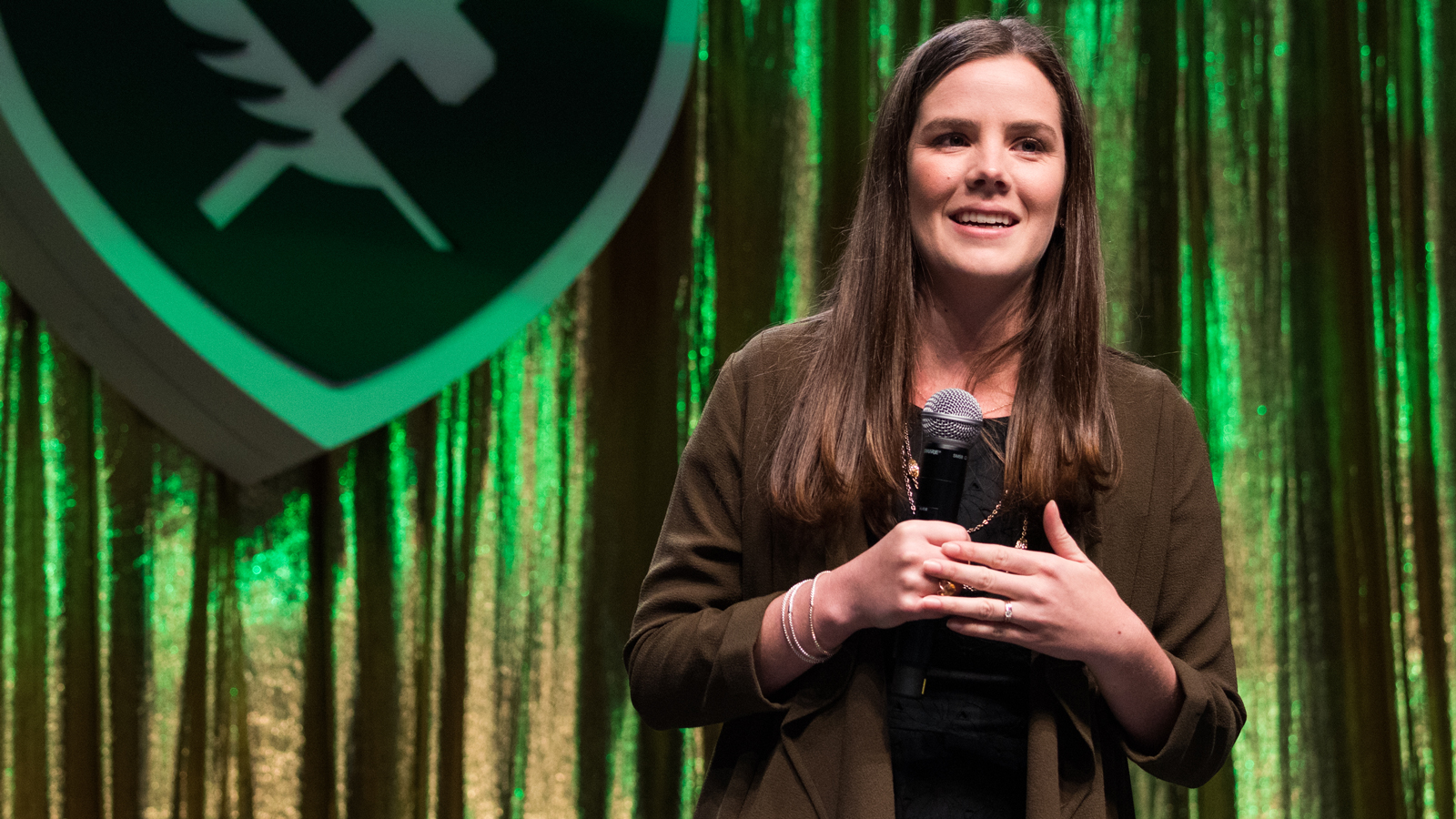Alydia Health: Building a Multimillion Dollar Company with the CIE

Postpartum hemorrhage, or excessive bleeding after giving birth, is the leading cause of maternal death in the world, according to the World Health Organization. Graduated Incubator company Alydia Health, formerly InPress Technologies Inc., is working to prevent postpartum hemorrhage with their innovative medical device, the Jada System.
Postpartum hemorrhage is commonly treated with a balloon tamponade, which uses positive pressure to compress bleeding vessels. The Jada System uses a vacuum, or negative pressure, to initiate contractions and stop the bleeding. The device was Food and Drug Administration (FDA) cleared in August of 2020 and is being used in hospitals throughout the US.
The original Jada was designed in 2011 by then-Cal Poly biomedical engineering seniors Davis Carlin and Alex Norred. The pair entered the device into Innovation Quest, an annual business plan and innovation competition founded at Cal Poly by Carson Chen, Laura Pickering, and Rich Boberg, and now hosted by the Cal Poly Center for Innovation and Entrepreneurship (CIE). Their team came in second.
Carlin and Norred then took their idea to the Summer Accelerator, a program designed to help student innovators turn their ideas into a real, scalable business. Jessie Becker Alexander, a Cal Poly business student who was working for the CIE as a student entrepreneur, was helping to run the program.
Becker Alexander had crossed paths with Carlin and Norred at Innovation Quest, but began to work more closely with the pair throughout the course of the HotHouse Accelerator.
“I had my little cubicle as a CIE employee, so I was working at the CIE and then I’d go check on what was going on in the [Alydia Health] office,” Becker Alexander recounted. “I was doing both at the same time.”
Becker Alexander ultimately co-founded Alydia Health along with San Luis Obispo-based medical device engineer Nathan Bair, who she met through the Cal Poly Small Business Development Center (SBDC).
“The company was really lucky that we were in this space right when the Center for Innovation and Entrepreneurship was starting,” Becker Alexander said. “The support from the CIE community as a whole was incredibly important, both the peer support as well as all of [the CIE’s] structured programs… Starting something is hard, and being a part of a community like that was really important.”
The CIE not only offered a supportive community, but provided Alydia Health with resources that were integral to the startup’s eventual success.
The CIE connects their startup teams with mentors who can provide insights into the startup process within different industries. Alydia Health was paired with Jan Haynes, a business development executive in the medical device industry.
Haynes began working with Alydia Health “before it even felt like a company,” said Becker Alexander. She helped the team to understand the medical device market, connected them with doctors who showed interest in the product and walked them through the approval process for medical devices.
“She was the first one who helped us pull back the curtain and understand what we would need to do if we really wanted to bring this device to market,” Becker Alexander said.
Early investors were another valuable resource, providing the Alydia Health team with access to not only funding, but mentorship.
“When you bring on the right investors with the right kind of background and knowledge and expertise, they can propel your progress even faster,” Becker Alexander said.
Many of Alydia Health’s early investors provided the startup with guidance that helped them to avoid common mistakes and maximize their chances of success. They also presented the Alydia Health team with networking opportunities that allowed them to connect with and learn from other industry experts.
One of Alydia Health’s most notable investors was the Global Health Investment Fund (GHIF), a fund designed to finance the development of drugs, vaccines and other medical innovations that fight against diseases disproportionately affecting low- and middle-income countries.
“When we were able to raise money from the Global Health Investment Fund, that was a really big deal for us,” Becker Alexander said. “It was really gratifying to be able to work with an investment group that believed in our mission and the impact that it could have.”
The funding provided by GHIF helped Alydia Health to expand their reach and branch into low-income markets, which according to Becker Alexander, “has always been core to the company’s mission and culture.”
Alydia Health was recently acquired by Organon & Co., a spinoff of multinational pharmaceutical company Merck & Co. Inc., for $240 million. This development will allow Alydia Health to expand even further, saving thousands of mothers’ lives in the process.
“I’m incredibly excited about the acquisition and the partnership with Organon,” Becker Alexander said. “From the very beginning, everything we wanted for the company was to partner with an organization that has the resources to help propel access to technology even more quickly than we could do on our own.”
The Jada System will be introduced into Europe and other developed countries, as well as underdeveloped countries lacking affordable access to women’s healthcare, said Organon CEO Kevin Ali in a Business Wire press release.
Organon has experience in creating affordable access for underdeveloped markets. Their acquisition of Alydia Health will rapidly increase access to the Jada System.
“Right now, with everything that’s happening with the acquisition, I just feel an immense sense of gratitude that there are so many people out there who believe in the same mission,” Becker Alexander said. “When you have a mission like we have, to save women’s lives around the world, being true to that mission in everything we do — that’s what created success for us.”
Becker Alexander is grateful not only for the support that she received from investors, but also the support she received from the CIE and the San Luis Obispo community at large.